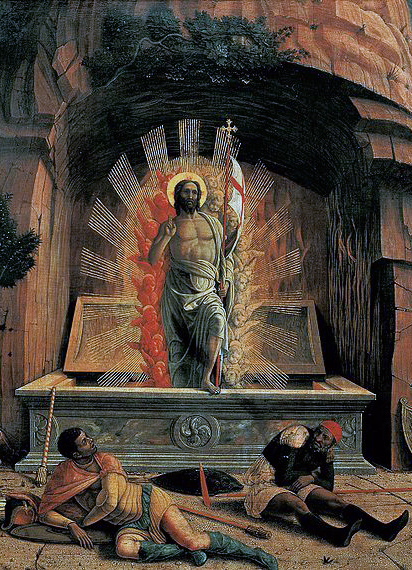 Editor’s note: In ‘The resurrected Jew’ I wrote: ‘With the characteristic symmetry of the Renaissance, Mantegna composed this Resurrection in which the resurrected Jew is the luminous axis of the scene… Always keep in mind that the doctrine of the Resurrection was plagiarised by the Jews who originated the Christian sect. They simply used the story of the founding hero-God of the Romans: Romulus. The idea of those who wrote the New Testament was simply to use the mythological biography of the white God to convince the Romans to better worship the god of the Jews’.
Editor’s note: In ‘The resurrected Jew’ I wrote: ‘With the characteristic symmetry of the Renaissance, Mantegna composed this Resurrection in which the resurrected Jew is the luminous axis of the scene… Always keep in mind that the doctrine of the Resurrection was plagiarised by the Jews who originated the Christian sect. They simply used the story of the founding hero-God of the Romans: Romulus. The idea of those who wrote the New Testament was simply to use the mythological biography of the white God to convince the Romans to better worship the god of the Jews’.
Below we continue the German-English translation of the preface to Monologues at the Führer’s Headquarters 1941-1944, the Records of Heinrich Heim edited by Werner Jochmann—a translation that we had suspended because of the other translation, that from French to English of Savitri’s book.
If there had been mobile phones in the 1940s, Hitler’s after-dinner monologues would have been recorded down to the intonation of his voice. But what we got is what we got.
However, the imperfect text of the table talks still reflects that the Führer wanted to solve the Christian problem (see my emphasis in red below). And it would have been solved if he had won the war. In that hypothetical parallel world, American white nationalists wouldn’t be celebrating the resurrected Jew, as they did yesterday. In the preface of the German edition we read:
______ 卐 ______
Picker’s selection and reproduction of the sources also give rise to objections. For example, he included a document under number 6 in his edition of the table discussions that is missing from Bormann’s collection. It does not belong to the conversation notes, nor was it recorded and handed down by Heim. Record 7—number 16 in the present edition—is incorrectly dated. Picker adds two sentences to the note of 21 July 1941 at the end which do not exist in the original. There is no space here to register all the carelessness that Picker committed in transcribing Heim’s texts. Henceforth, the originals from Bormann’s collection published in this volume should be used in any case, especially since Picker has occasionally even compromised the substance of the statement in his transmission. According to Picker’s text, Hitler declared on 13 December 1941: ‘The war will come to an end. The last great task of our time is then to be seen in still settling the church problem’. In Heim’s original, on the other hand, the passage reads: ‘The war will come to an end, and I shall see my last task in life in settling the church problem’. It is surely significant that Hitler himself still intended to fight the battle against the churches.
But Picker was not only negligent in transcribing other people’s texts; he also failed to take the necessary care in reproducing his notes. In the note of 2 July 1942, for example, he says: ‘After reviewing the report, the chief remarked that one could not, however, have expected such a rapid write-off of Egypt by the English’. The following sentence in Picker’s publication reads: ‘Besides, the lies show that once Churchill is dead, we will have to make sure that his unshakeable loudmouthedness does not live on’. This sentence is missing from the original version of the Bormann Collection signed by Picker. Finally, a trivial sentence is inserted at the end of the document, which is also missing from the transcript given to the client. It is also unacceptable that Picker occasionally mixes his observations and comments with the interview transcripts, so that Hitler’s statements are not clearly distinguished.
Update of April 25:
I completely forgot to add the footnotes—:
Ibid., doc. 11, 13. 12. 1941, p. 80.
Document 65 of this issue, see p. 150.
Picker, Hitlers Tischgespräche doc. 165, p. 406.
Ibid., Doc 49, p. 151; Doc 50, p. 154.
—that will be properly added in the book, once I can relaunch my Daybreak Press.
3 replies on “The Führer’s monologues (iv)”
The previous translated instalments of the preface can be read here, here and here.
Richard Carrier who is hell-bent on proving Hitler was a Christian thinks Picker’s as being more reliable, his reason is Henry Picker’s notes never was in the hands of François Genoud, so they might have not been manipulated.
But even with Henry Picker’s edition, there are tons of Anti-Christian quotes.
Here.
https://imgur.com/JwM4tHX
https://imgur.com/oIhSoyi
https://imgur.com/3pmdbeW
https://imgur.com/fIBSjAb
https://imgur.com/QlYpy5n
https://imgur.com/NldLBQM
https://imgur.com/nMJ8Lx9
https://imgur.com/u1D3Qrh
https://imgur.com/xDdBTcr
https://imgur.com/a/UHd1fOY
https://imgur.com/XMf2Fqt
https://imgur.com/cBan8xz
https://imgur.com/yZtbe7W
https://imgur.com/jQRnM55
https://imgur.com/ovMjvKk
https://imgur.com/AWD2226
https://imgur.com/JcLCqod
https://imgur.com/cNkRQb3
https://imgur.com/oLUGfi8
https://imgur.com/wmPh27G
https://imgur.com/sgFUMip
https://imgur.com/sgFUMip
Robert Morgan and I have criticised Carrier here and here.